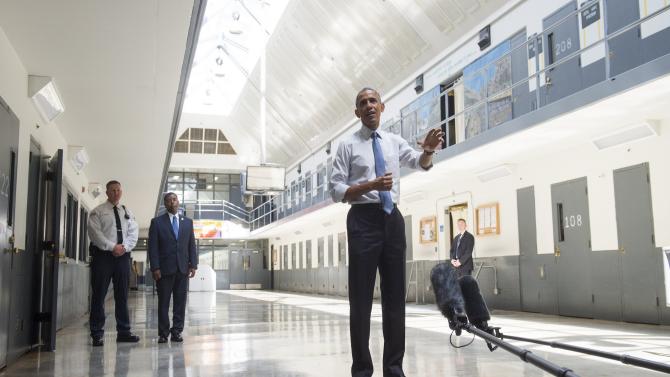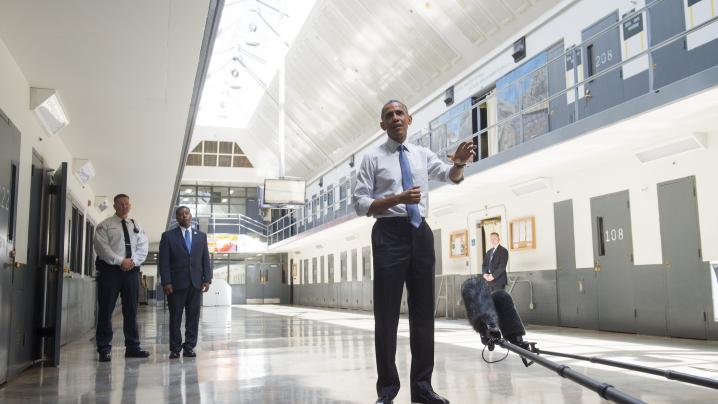[ad_1]

President Barack Obama speaks as he tours the El Reno Federal Correctional Institution in El Reno, Okla., July 16, 2015. Obama was the first sitting U.S. president to visit a federal prison.
SAUL LOEB/AFP/Getty Images
In an op-ed for the Washington Post, President Barack Obama announced an end to solitary confinement for juvenile offenders in the federal prison system, citing the potential long-term psychological effects.
Obama began his piece, which appears in Tuesday’s edition of the Post, by outlining the story of Kalief Browder, a Bronx, N.Y., teen who was arrested for allegedly stealing a backpack but was never charged. He spent three years at New York’s Rikers Island jail, with a large portion of that time spent in solitary confinement.
“In 2013, Kalief was released, having never stood trial,” the president wrote. “He completed a successful semester at Bronx Community College. But life was a constant struggle to recover from the trauma of being locked up alone for 23 hours a day. One Saturday, he committed suicide at home. He was just 22 years old.”
President Obama’s announcement on solitary-confinement reform comes four months after the release of an investigative documentary, produced by The Root’s sister network Fusion, titled Prison Kids, which looked at the effect solitary confinement has on children.
The series was accompanied by several articles that detailed the psychological trauma that solitary confinement can have on youths, including mental-health problems as well as physical and mental abuse. The series ended with a petition drive urging the president not only to stop solitary confinement for children but also to rethink the practice.
“Research suggests that solitary confinement has the potential to lead to devastating, lasting psychological consequences,” the president wrote in the op-ed.
“It has been linked to depression, alienation, withdrawal, a reduced ability to interact with others and the potential for violent behavior. Some studies indicate that it can worsen existing mental illnesses and even trigger new ones. Prisoners in solitary are more likely to commit suicide, especially juveniles and people with mental illnesses,” he wrote.
The president also announced several changes in how long prisoners can be placed in a segregated cell, including shortening the stay of a first offense from 365 days to 60 days.
“The Justice Department has completed its review, and I am adopting its recommendations to reform the federal prison system,” Obama wrote. “These include banning solitary confinement for juveniles and as a response to low-level infractions, expanding treatment for the mentally ill and increasing the amount of time inmates in solitary can spend outside of their cells. These steps will affect some 10,000 federal prisoners held in solitary confinement—and hopefully serve as a model for state and local corrections systems. And I will direct all relevant federal agencies to review these principles and report back to me with a plan to address their use of solitary confinement.”
The president added: “The United States is a nation of second chances, but the experience of solitary confinement too often undercuts that second chance.”
Read more at the Washington Post.
[ad_2]





















